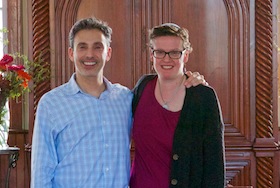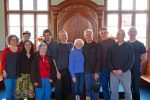The Or Shalom board of directors with Rabbi Hannah Dresner, second from the left in the front row. (photo by David Kauffman)
Most Jews would agree that usually rabbis do the bulk of the talking and congregants the listening. That’s been reversed for the Listening Tour currently underway among rabbis of ALEPH: Alliance for Jewish Renewal. The tour is making 13 stops in North America, as well as listening via video and Skype to Renewal communities all around the world. On March 25, the tour stopped in Vancouver, where it was hosted by Or Shalom.
Rabbis Rachel Barenblat and David Markus, ALEPH co-chairs, have embarked on the tour to hear from the breadth and depth of the community, including those not technically affiliated with the Renewal community but “aligned in method, intention and heart.”
“Every stop on the ALEPH: Jewish Renewal Listening Tour is different, and every one has been amazing in its own way. But I suspect that our weekend in Vancouver may stand out in memory as one of the most memorable experiences in a year-plus of remarkable experiences,” wrote Barenblat on her blog, the Velveteen Rabbi.
“Maybe that’s in part because we traveled such a very long way to be there. Maybe it’s in part because we were visiting such a storied community, one of the largest and longest-standing Jewish Renewal communities in the world. Maybe that’s in part because the people at Or Shalom welcomed us with such open hearts.”
“When ALEPH decided to go on a listening tour, it initially was to take the pulse of the Jewish Renewal movement, but it has come to mean for us and for stakeholders in the broader renewing of Jewish life so much more than that,” said Markus. “There is a yearning in Jewish life today that reaches through all the denominations … we are seeing a global consciousness arise about the need to reconnect Jews with the heart and soul of tradition, to experience the riches of spiritual life, and to address emerging social and ecological challenges.”

Markus explained that Jewish Renewal has grown organically, and was not created on the basis of strategy or design. “The time has come,” he said, “to introduce an element of design.” How should the Renewal movement take its rightful place in ecosystem of Jewish life? What does Jewish life need now? How to meet the needs of millennials? Summing up, Markus said, “How are we relevant for the 21st century and beyond?”
Speaking of the tour in a recent Or Shalom newsletter, the congregation’s spiritual leader, Rabbi Hannah Dresner, wrote, “They were here to gather information for their own discernment as they shape the next iteration of the ALEPH: Alliance for Jewish Renewal. But we had a bit of our own agenda, and that was to speak and hear the stories, challenges and hopes of Or Shalomniks for the flourishing of our home community and for our collective and personal senses of belonging, contentment and inspiration…. I listened very carefully, and my heart ached with the poignancy and beauty of the nostalgia, the hurts, the longings and the aspiration I heard spoken.”
On the Friday evening, the visit commenced with davening, followed by dinner, after which those gathered heard some of the origin stories and histories from Or Shalom’s almost 40 years of existence, starting with the early years as a chavurah in Rabbi Daniel Siegel and Rebbetzin Hanna Tiferet Siegel’s living room.
On the Shabbat, there were diverse sessions of listening at which different segments of the community were invited to speak and be heard. Younger members of the community expressed their desire for open, free dialogue, deep ecumenicism and freedom from xenophobia; members of the community who felt marginalized had a chance to tell their stories; elder members spoke of their desire to keep the best of Or Shalom alive and their anxiety to pass the torch to the next generation. Many other voices were heard, and the rabbis listened. “By being listened to,” Markus told the Independent, “people feel empowered to do the work that this era demands.”
Dresner was particularly moved around finding solutions for those who feel marginalized. “What can we do to optimize a young mother’s spiritual experience when she comes to shul with very small children?” she asked. “And how can we create a cohort for her? How can we offer community to individuals who remain single as couples form and begin to have babies? What will it take to go beyond friendliness in developing a deeper queer consciousness?”
The weekend unfolded over what Barenblat called “meetings and meals and meetings over meals,” including a trip on Sunday to the Vancouver vegetarian institution that is the Naam restaurant.
The Vancouver leg of the tour wound down Sunday evening, and so came to an end the ninth stop the rabbis have made so far. “It’s an honor and a privilege,” wrote Barenblat on her blog, “to get to sit with people and hear their yearnings and hopes for what ALEPH and Jewish Renewal might become.”
Matthew Gindin is a Vancouver freelance writer and journalist. He blogs on spirituality and social justice at seeking her voice (hashkata.com) and has been published in the Forward, Tikkun, Elephant Journal and elsewhere.

